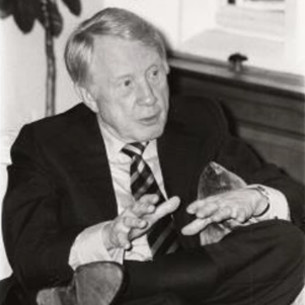About
The Stanton Foundation was created by Frank Stanton, who is widely regarded as one of the greatest executives in the history of electronic communications and one of the television industry’s founding fathers.
CBS
He was the master builder of CBS, turning an also-ran radio network into a broadcasting powerhouse. Stanton became president in 1946 and served for 25 years. He was a pioneering advertising researcher, inventing the first radio advertising audience counting device a precursor of today’s “people meter” to give CBS an early competitive edge with sponsors.
The Great Debates
In 1960, Stanton initiated the first televised presidential debates -- the famous Nixon-Kennedy “Great Debates” -- which required a special Act of Congress before they could proceed. These debates are widely credited with giving Kennedy his margin of victory, and have become a staple of American presidential campaigns.
International Security Interests
During his years at CBS and thereafter, Stanton maintained an abiding interest in international security and American foreign policy. He was a lifetime member of the Council on Foreign Relations, chairman and trustee of the RAND Corporation, chairman of the American Red Cross, chairman of the Visiting Committee of the Harvard Kennedy School, and Chairman of the US Advisory Commission on Information.
He also served on numerous presidential commissions charged with preparing the US for the realities of living in a nuclear world. His involvement with nuclear issues began with his appointment to a committee convened by Dwight Eisenhower in 1954 to develop the first comprehensive plan for the survival of the U.S. following a nuclear attack. Stanton had lead responsibility for developing a plan for national and international communication in the aftermath of a nuclear incident.
The Stanton Foundation, in accordance with his wishes, supports work in nuclear security. It has established of chairs in nuclear policy studies at MIT and Stanford. It funds the Stanton Nuclear Security Fellows Program and the International Affairs Fellowship in Nuclear Security. It also provides support for course development of nuclear related topics at schools and universities both within the US and abroad.
